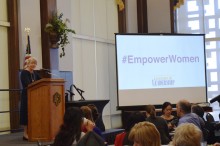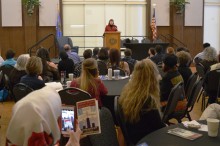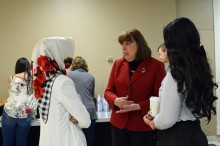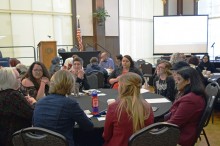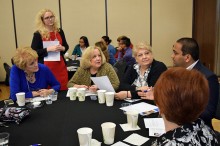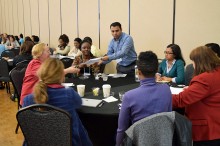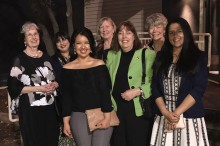2017 Oklahoma
First CTAUN Conference in Oklahoma
EMPOWER WOMEN: CHANGE THE WORLD
Saturday 8 April 2017
University of Central Oklahoma.
Keynote Speaker: Virginia Gamba, Assistant Secretary General at the United Nations
The conference was sponsored by the University of Central Oklahoma, The University of Oklahoma – College of International Studies and CTAUN. It was under the organizational leadership of Dr. Jarrett Jobe.
Anne-Marie Carlson, CTAUN Chair, informed the audience of 180 attendees about CTAUN and introduced Virginia Gamba, an Assistant Secretary General at the United Nations in New York, as the keynote speaker. Ms. Gamba stated that she could not speak “for” the U.N., but could give her views. She cited the 1945 U.N. Charter, which spoke of the equality of women and men. This has not been realized because governments have forgotten these initial obligations and agreements. Ms. Gamba noted that women are masters of adaptation, making do with what they have, while lacking what they need. As a young girl she corresponded with the author Robert Graves, and shared his advice to her: keep up your spirits and guard your heart from heartbreak. She encouraged women to be mentored and to mentor others, creating a chain to success.
A question and answer period followed her presentation and led into an Advisory Session, piloted by Dr. L. Churchill, who immediately asked everyone to change seats and meet new people. This created individual groups. The lead topic was “Are you an advocate?”
One group decided that activism is not just rallies, workshops and demonstrations, but local involvement – aka- volunteering on various levels. The importance of making connections among activists was also stressed.
A delicious lunch did not interrupt the flow of discussions, but allowed attendees time to check out the resource fair and to meet other participants.
The afternoon session began with the Special Topic of Human Trafficking, It was introduced by Melissa Eicks, Co-Founder and Director of Communications for the Dragonfly Home, a relief and restoration center for victims of human trafficking. She gave an eye-opening example of a young woman “roped-in” via the internet.
Ms. Eicks was followed by Kim Weems, an F.B.I. agent, who works with Dragonfly. Agent Weems asserted there is no such person as a “child prostitute.” She cited various sources of people becoming trafficked – poverty, spousal abuse, mental health, drugs and families trafficking members.
The second afternoon sessions was about “Leadership.” It was opened by author Nyla Ali Khan of Kashmir, who commented on the overpowering control of culture, even over religion. Religions may recognize the rights of women, but local cultures are male dominated and, thus, use religion as an excuse to support culturally repressive practices.
She was accompanied by Kendra Horn, executive director of Sally’s List and Women Lead Oklahoma. Sally’s List is unique to Oklahoma, and supports all women candidates, regardless of party affiliation. Ms. Horn cited how women undervalue their skills, giving the example of men applying for a job, which they only feel 50% qualified for, while women must feel 90% qualified before applying. She suggested “stepping-out.” When one does, they take others along. She proposed that women need men as “allies and mentors,” and that relationships should be less adversarial.
The conference concluded with a legislative panel, introduced by Dr. R. Cruise of OCU’s College of International Studies. Rep. Leslie Osborn
(R) came to government service after her children had grown and chairs the finance committee in the Oklahoma House of Representatives. She emphasized that women need to believe they can “do the job” and run for public office. Rep. Emily Virgin (D) stated that women in politics need to work harder to overcome more negativity from the public. Senator Kay Floyd (D), a former judge, underlined the importance of local control and participation. All three office holders encouraged women to be involved on the local government levels – e.g. school boards, town councils and boards, as an entry into politics.
Women’s political failure is not that they don’t win, but that they don’t run.
The conference promoted the involvement of women in activism and politics, as both mentors/mentees as well as allies.

